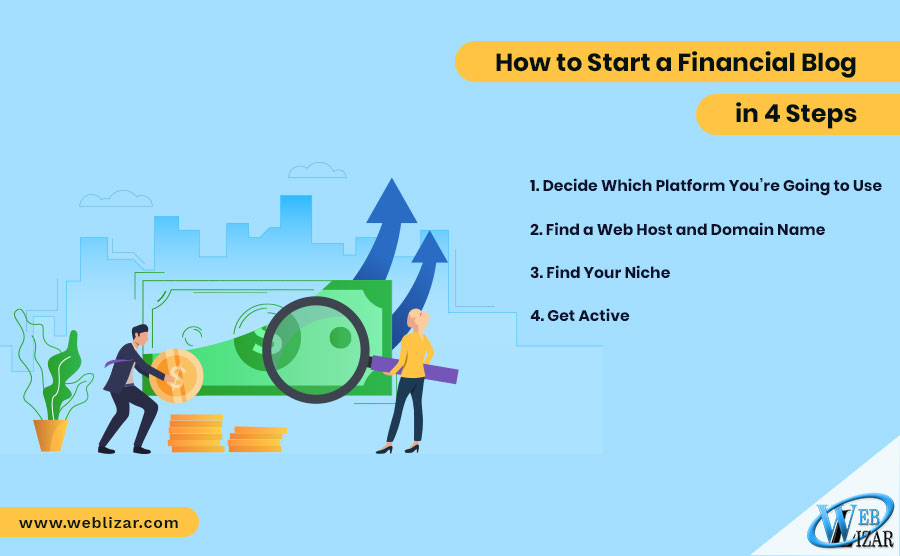How to Start a Financial Blog in 4 Steps 2024

How to Start a Financial Blog in 4 Steps: The financial niche is a great one for blogging for several reasons. For one, it is one of the biggest niches out there. It is also very diverse, with almost infinite possibilities for content. And it’s a niche that can fairly easily be monetized as well.
However, if you’ve never blogged on finance, or at all for that matter, then you might be lost as to where to start and what you should do to make it popular. But, building a blog shouldn’t be intimidating, as there are plenty of user-friendly resources out there for bloggers of all levels. Here’s what you need to do if you want to build a successful financial blog.
How to Start a Financial Blog in 4 Steps
1. Decide Which Platform You’re Going to Use
If you want to build a blog and have no programming experience, know that you don’t have to design one from scratch or even hire somebody. There are plenty of blogging platforms that you can use out there, and most of them are made with beginners in mind.
If you want to build a serious blog, then you probably want to choose its name. So, we can already scratch off free standalone platforms like Blogger. What you need is a WordPress site.
WordPress is a content management system and was primarily created for blogs, though you can use it for complete websites too. It’s super easy to use, and you’ll be able to modify and add content easily, even if all you have is basic HTML knowledge.
Also Read: Top Tips on How to Start Creating a Professional Blog
It also uses what is referred to as “themes”. This allows you to completely change the site’s design in seconds with no programming necessary, and you can find tons of affordable themes catered to the finance niche. You can download WordPress and install it manually, or go with a web host that offers one-click installation. Which brings us to our next step.
2. Find a Web Host and Domain Name
Know that you will need to sign up for a hosting package for your blog. But don’t worry, as hosting is very affordable, and you can get hosting for as little as $8 per month. However, that doesn’t mean that you should go with the cheapest option. Shared hosting will usually be cheaper, but less reliable as you’ll be sharing it with hundreds of other sites. A better option would be to pay a little more and go with a virtual private server.
Domain names are also very cheap. You can find a domain name on a place like NameCheap for under $10. Make sure that the name is unique, and know that it doesn’t have to be a finance-related sounding name. Names like “The Motley Fool” for instance don’t sound very financial. It’s all about the brand, first and foremost.
3. Find Your Niche
You can decide to be a generalist, but there are tons of angles that you can take if you want to carve a niche for yourself. You could write about financial technology and cryptos for instance, or talk about budgeting or frugal living if you want to target a consumer niche.
Another thing you could consider is specializing yourself. For instance, you could pursue an MBA with an accounting concentration and add some feathers to your cap. This will allow you to be more credible, which will add legitimacy to your blog and allow you to talk about more topics.
Check Now – How to Start a Blog in Under 30 Minutes
You don’t even have to go to a traditional school to get one either. Schools like Suffolk University, for instance, have great MBA programs you can take on your free time without skipping a beat. Being an actual expert will go a long way when it comes to showing your expertise and building your brand as well.
4. Get Active
Another advantage of actually being an expert is that it will open many doors for you. But the most important thing is getting involved in as many communities as you can and making your presence felt.
But don’t ask for anything at first – go on financial YouTube channels, blogs, and social media groups. Get active in the comments. If you’re active enough or catch the attention of the owner, try to build a rapport with them.
And once this is done, you could always ask them if they would be open to you posting on their blog, or featuring on their channel. Conversely, you could also ask them if they’d like to feature on your blog or hold an interview. This will instantly give you access to a large established audience.
Also Read: Tag Archives: how to write blog
As you can see, starting a blog isn’t rocket science. However, it does take some savoir-faire, and you have to prepare to do the legwork if you want it to be a success. Make sure that you follow these few tips, and always work on refining your skill set and content.
FAQs”
How do I start a finance blog?
Select a niche, set up a blog on a platform like WordPress, create quality content, promote through social media, engage with your audience, and monetize with ads or affiliate marketing.
How do I start a financial advisor blog?
To start a financial advisor blog:
1. Establish expertise in a specific area of finance.
2. Choose a reliable blogging platform like WordPress.
3. Create informative content tailored to your target audience's needs.
4. Promote your blog through social media, networking, and guest posting to attract readers and clients.
How do I start a blog step by step?
Choose a niche, set up a blog using a platform like WordPress, create engaging content, and promote through social media to attract readers.



Leave a Reply